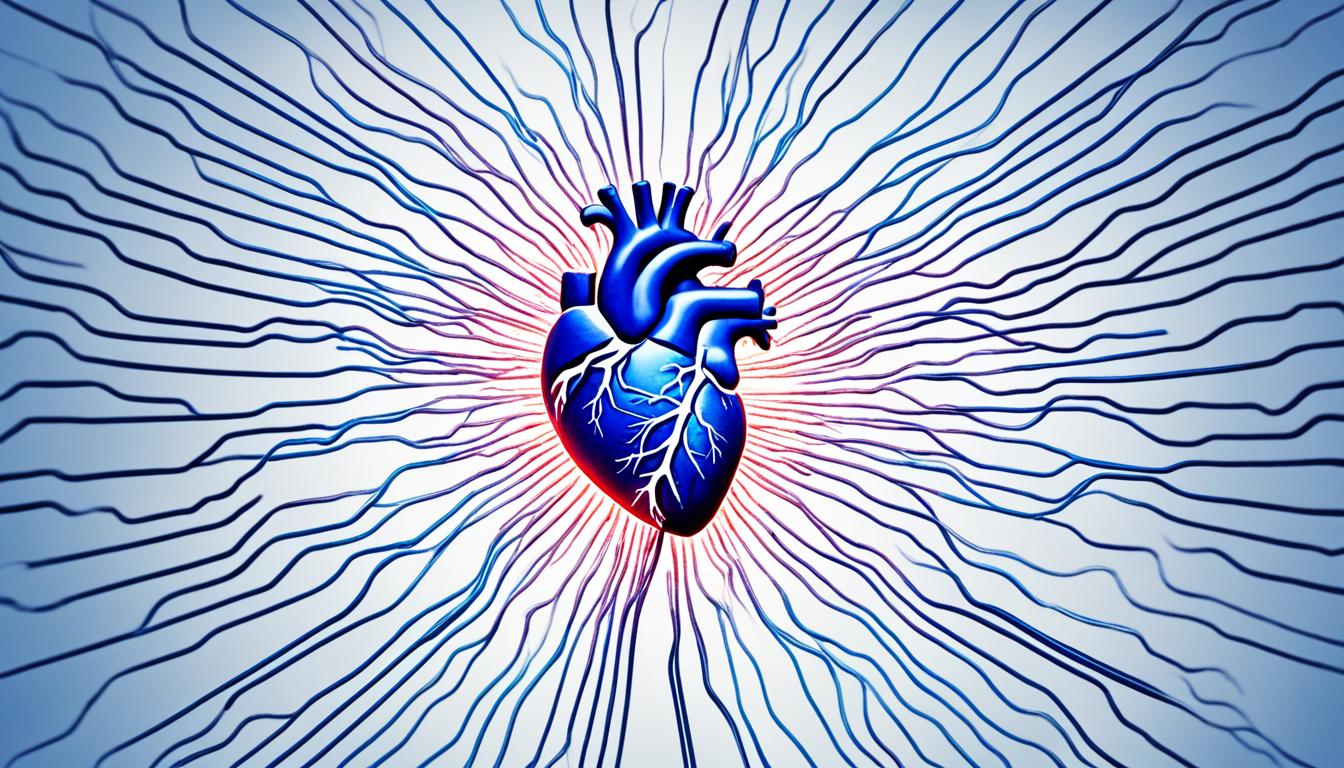Supraventricular tachycardia (SVT) causes a fast heart rate from the heart’s upper chambers. It’s also known as tachyarrhythmia. This can lead to an irregular heartbeat, palpitations, and more. These can affect a person’s daily life a lot.
Those with SVT might feel like their heart is racing or beating hard. They could also have trouble breathing, feel dizzy, or chest pain. This condition can come from heart electrical issues, heart conditions, too much caffeine or alcohol, and some medicines.
Doctors use many tests to diagnose SVT, including a full medical history and physical check-up. They might also do an electrocardiogram, Holter monitor, and other studies to be sure about the condition. These help spot the problem accurately.
For SVT, there are different ways to treat it. Doctors might give you medicines to slow your heart down and make you feel better. But, in some situations, they might suggest a procedure called catheter ablation. This process fixes the heart’s abnormal electrical pathways to stop SVT.
Key Takeaways:
- Supraventricular tachycardia (SVT) starts in the heart’s upper chambers, causing a rapid heartbeat.
- Symptoms include feeling like your heart is racing, shortness of breath, dizziness, and chest pain.
- SVT might happen because of heart electrical issues, underlying heart problems, too much caffeine or alcohol, and specific drugs.
- To diagnose SVT, doctors do a deep analysis, looking into your medical history, checking you up, and running tests like ECG and Holter monitor.
- SVT treatment options include drugs, catheter ablation, and sometimes, stem cell therapy.
Symptoms of Supraventricular Tachycardia
Supraventricular tachycardia (SVT) has many different symptoms. The most common one is a fast and irregular heartbeat. People might feel their heart flutter or pound hard. They could also have trouble breathing, which can be scary. This symptom often leads to feeling anxious.
Chest pain is another common sign of SVT. During an episode, the pain is usually sharp and appears suddenly. It’s essential to know that chest pain may point to a serious heart issue. If chest pain persists, it’s best to see a doctor right away.
Dizziness and feeling lightheaded can happen with SVT, especially when the heart beats quickly. People might feel unsteady or that the room is spinning. If you feel dizzy, it’s safer to sit or lie down to avoid getting hurt.
Knowing the signs of SVT is vital. If you experience more heartbeats, palpitations, or any of these symptoms, see a doctor. While these symptoms may stop on their own, it’s critical to find their cause and treat it properly. SVT might indicate a heart issue that needs medical care.
When to Seek Medical Attention
If any of the following symptoms happen, seek help right away:
- Severe chest pain
- Fainting or loss of consciousness
- Sudden shortness of breath
- Severe dizziness or lightheadedness
These signs could mean something very serious or a complication of SVT. Quick medical care is important for a fast and correct diagnosis, which helps get the best treatment.
– one of the common symptoms of SVT.
Recognizing SVT symptoms is key to dealing with this heart issue. A healthcare professional can provide the right diagnosis and treatment plan. So, it’s vital to talk to a doctor if you’re concerned about SVT.
Causes and Risk Factors of Supraventricular Tachycardia
Supraventricular tachycardia (SVT) is often caused by electrical abnormalities in the heart. These issues may involve abnormal pathways or circuits. They can disrupt the heart’s normal signals, causing fast heartbeats.
Underlying heart conditions also play a role in SVT. Conditions like heart defects, valve issues, and heart failure can increase the chances of SVT. They make the heart more prone to episodes of fast beating.
Excessive caffeine or alcohol use is a known risk for SVT. These substances can throw off the heart’s rhythm, especially in people already at risk. It’s important to limit caffeine and alcohol to help prevent SVT.
Some medications are linked to SVT as well. Drugs for asthma or thyroid issues, for instance, can affect the heart’s electrical system. This effect can cause an irregular heartbeat. If you’re taking any medication and you experience SVT symptoms, see your doctor right away.
| Causes of Supraventricular Tachycardia | Risk Factors for Supraventricular Tachycardia |
|---|---|
|
|
|
|
|
Stem Cell Therapy for Supraventricular Tachycardia
Stem cell therapy is a new way to treat SVT and other heart rhythm issues. It uses stem cells to fix damaged heart tissue and restore normal beats. This method is making big steps in treating heart problems like SVT.
Even though it’s new, studies and tests are showing good signs. Stem cell therapy places new heart cells by putting stem cells right into the heart. This helps grow new, healthy cells and fixes the root causes of SVT.
The study of stem cell therapy is growing fast. Scientists are looking at better ways to use stem cells for SVT treatment. Soon, stem cell therapy could change how we treat heart problems, including SVT, offering better results.
Stem cell therapy gives hope for treating SVT in the future. Early on, it’s showing it could be a big breakthrough in heart care. With more study and tests, this method could be a game-changer for SVT patients.

